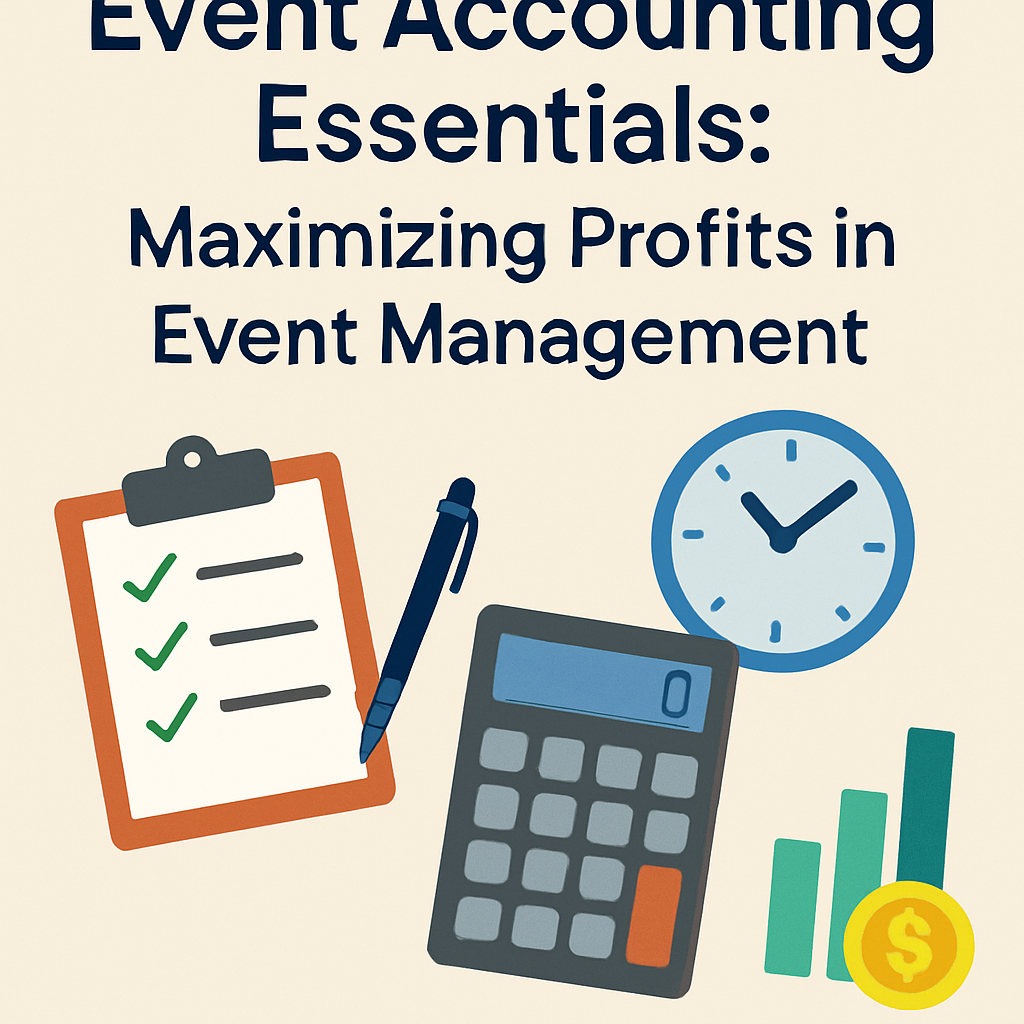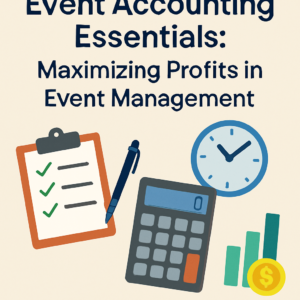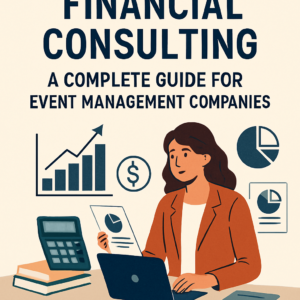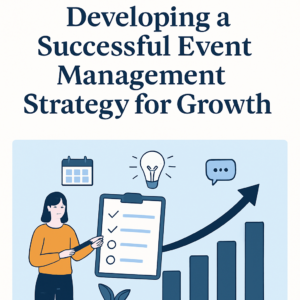Event Accounting Essentials: Maximizing Profits in Event Management
Introduction
Welcome to the wild world of event accounting, where numbers dance and profits prance! If you’re in the business of corporate event management, you know that every detail counts from the venue to the vendor payments, and yes, even those pesky little receipts that seem to multiply like rabbits.
But fear not! Understanding event financial management is your golden ticket to maximizing profits while keeping stress levels at bay. Think of it as your trusty roadmap through the labyrinth of budgeting for events, expense tracking, and financial reporting. Because let’s face it: no one wants a surprise when it comes to cash flow management in event planning!
In this blog post, we’ll dive into the essentials of event accounting, covering everything from cost control in event management to strategic financial planning for events. Along the way, we’ll debunk some common misconceptions and arm you with actionable insights that you can implement today.
Did you know that the global event management software market was valued at a whopping .36 billion in 2020? It’s expected to grow at a compound annual growth rate (CAGR) of 11.2% from 2021 to 2028! That’s right this industry is booming, and understanding how to manage your finances effectively is more crucial than ever.

Understanding Event Accounting
Welcome to the world of event accounting, where numbers meet creativity and financial strategies fuse with the excitement of planning unforgettable experiences. So, what exactly is event accounting? Simply put, it’s the meticulous process of managing all financial aspects associated with an event from budgeting to tracking expenses, and ensuring everything adds up at the end of the day.
Imagine you’re throwing a party. You wouldn’t just invite guests without knowing how much cake you can afford, right? The same logic applies to events on a grander scale. This is where event accounting services swoop in like superheroes, helping you keep your finances in check while you focus on creating memorable experiences.
Definition of Event Accounting
Event accounting encompasses all financial activities related to planning and executing an event. This includes everything from initial budgeting to expense tracking, financial reporting, and even tax planning for events. It ensures that all monetary transactions are recorded accurately and that there’s a clear understanding of how funds are allocated throughout the event lifecycle.
Importance of Event Accounting Services
Why should you care about this? Because effective accounting for events can mean the difference between a successful gathering and a financial disaster. Here are a few reasons why:
- Maximizing profits: By keeping tabs on every penny spent and earned, you can identify areas for cost savings and revenue generation.
- Financial transparency: Stakeholders appreciate clarity in finances; it builds trust and credibility.
- Informed decision-making: Accurate data allows for better strategic planning in future events.
Overview of Accounting for Events
The process starts with comprehensive budgeting for events projecting costs versus potential income from ticket sales, sponsorships, or merchandise. Once your budget is set, it’s all about keeping track of those expenses like a hawk! This involves using effective methods for event expense tracking that ensure nothing slips through the cracks.
Key Takeaway: Good event accounting isn’t just about crunching numbers; it’s about telling the story of your event through its financials. Understanding these fundamentals will empower you to make smarter decisions that boost your bottom line!
Key Components of Event Financial Management
When it comes to event accounting, understanding the key components of financial management is crucial for maximizing profits and ensuring a smooth event experience. Let’s break down the essentials that every corporate event manager should keep in their toolkit.
Budgeting for Events
First things first, let’s talk about budgeting. Think of your event budget as the blueprint for your financial success. Without a solid plan, you might end up with a beautiful venue but empty pockets. Here are some tips:
- Always start with a clear understanding of your overall budget.
- Break down costs into categories: venue, catering, entertainment, and marketing.
- Include a contingency fund because let’s face it, unexpected expenses are like surprise guests; they always show up!
Event Expense Tracking Methods
Next up is tracking those expenses. You can’t manage what you don’t measure! Here are some effective methods:
- Utilize software tools specifically designed for event expense tracking. They can streamline data entry and provide real-time insights.
- Create an Excel spreadsheet if you’re a DIY enthusiast just remember to update it regularly!
- Implement strict cash handling procedures to prevent any discrepancies.
Financial Reporting for Events
No one likes surprises when it comes to finances unless it’s free snacks at an event! Regular financial reporting helps you stay on top of your game:
- Create detailed profit and loss statements to analyze revenue against expenses.
- Dive into expense reporting regularly; this helps identify trends and areas where costs can be cut without sacrificing quality.
- Engage in post-event financial reviews to learn what worked and what didn’t this is crucial for future events!

Creating an Effective Event Budget
So, you’ve decided to throw the event of the century congrats! But before you start daydreaming about confetti and applause, let’s talk dollars and cents. Creating an effective event budget is like crafting a fine cocktail: it requires the right mix of ingredients, a dash of finesse, and a whole lot of attention to detail.
Event Budget Analysis Techniques
First things first let’s dive into event budget analysis. This isn’t just about slapping numbers on a spreadsheet and calling it a day. Here are some techniques to get you started:
- Historical Data Review: Look at past events for insights. What worked? What didn’t? This will help you forecast better.
- Itemized Budgeting: Break down all expenses into categories like venue, catering, entertainment, and marketing. This way, you can see where your money goes.
- Scenario Planning: Create best-case and worst-case scenarios for your budget. This helps in understanding potential financial risks.
Cost Management Strategies for Events
No one likes unexpected costs crashing the party! Here are some strategies for effective cost management in event planning:
- Vendor Negotiations: Don’t be afraid to haggle! Getting the best deals can save you big bucks.
- Sponsorship Accounting: Leverage sponsorships not just for funding but also for in-kind contributions. Every little bit helps!
- Contingency Funds: Always set aside 10-15% of your total budget as a buffer for unforeseen expenses. Think of it as your financial safety net.
Sponsorship Accounting in Events
Sponsorships can be a game-changer when it comes to budgeting for events. Not only do they provide cash flow, but they can also reduce costs significantly through in-kind services or products. Here’s how to keep track:
- Create Clear Agreements: Ensure that all sponsorship deals are documented clearly with terms outlined.
- Track Deliverables: Monitor what each sponsor provides versus what was promised to avoid discrepancies later on.
- Acknowledge Contributions: Always recognize your sponsors during the event. It fosters goodwill and could lead to future partnerships!
The bottom line? A well-structured event budget not only keeps your finances in check but also paves the way for profit maximization in events. Remember: budgeting is not just about cutting costs; it’s about making smart investments that enhance the overall experience.
If you’re ready to take your event accounting game up a notch, consider partnering with professionals who specialize in accounting for events they’ll help ensure that every penny counts!
Tracking and Managing Event Expenses
When it comes to event accounting, tracking and managing expenses is like being a tightrope walker: one misstep, and you could find yourself in a financial free fall. But fear not! With the right strategies, you can keep your balance and maximize profits.
Effective expense management isn’t just about crunching numbers; it’s about creating a smooth operational flow. Here are some best practices to ensure your event finances are as organized as your seating chart:
- Bookkeeping for events best practices: Regularly update your expense records. Use software tailored for event financial management to streamline this process. Think of it as your trusty sidekick, always ready to help you keep tabs on every dollar spent.
- Invoicing for event planners tips: Make invoicing a breeze with clear, detailed invoices that outline services rendered and payment terms. This not only helps with cash flow but also reduces the risk of disputes down the line. Remember, clarity is key just like a well-planned agenda!
- Vendor payments in event accounting processes: Establish a systematic approach to vendor payments. Set deadlines for when invoices should be paid to avoid late fees or strained relationships. Consider using digital payment platforms that allow for easy tracking and reconciliation of accounts.
But wait, there’s more! Here are some additional insights to elevate your expense tracking game:
- Expense forecasting for events: Predict future expenses based on historical data from past events. This will give you a clearer picture of where costs might spike and help you adjust your budget accordingly.
- Detailed expense reporting for large-scale events: For bigger events, create comprehensive reports that categorize expenses by type (e.g., venue rental, catering, entertainment). This analysis can help identify areas where cost control measures can be implemented.
- Reconciliation of event accounts: Regularly reconcile your accounts against bank statements to catch any discrepancies early on. It’s like checking your GPS before heading out better safe than sorry!
Pro Tip: Utilize cloud-based accounting software that offers real-time updates and collaborative features so you can manage expenses with your team seamlessly.
A common misconception is that tracking expenses is only necessary after an event has concluded. In reality, it’s an ongoing process that requires attention throughout the planning phase and even during the event itself. By keeping an eye on costs as they arise, you can make informed decisions that positively impact your bottom line.

The bottom line? Effective tracking and managing of event expenses is crucial for successful event accounting. By implementing these strategies today, you’ll not only enhance your financial reporting but also pave the way for profit maximization in all your future events!
Financial Reporting and Analysis for Events
When it comes to event accounting, financial reporting and analysis are your trusty sidekicks. Think of them as the Robin to your Batman essential for making informed decisions that save the day (and your budget).
Understanding Profit and Loss Statements in Events
A Profit and Loss (P&L) statement is like a report card for your event. It shows you how much money came in, how much went out, and whether you passed or failed in the profit department. Here’s what to include:
- Revenue: Ticket sales, sponsorships, merchandise.
- Expenses: Venue costs, catering, marketing.
- Net Profit: What’s left after all expenses are subtracted from revenue.
Diving into Detailed Expense Reporting for Large-Scale Events
For large-scale events, detailed expense reporting becomes crucial. It’s like having a magnifying glass on your finances. You want to track every dollar spent to avoid surprises that can derail future events. Here are some tips:
- Create categories: Break down expenses into manageable chunks venue, catering, entertainment.
- Use software: Leverage event financial management tools that automate tracking.
- Regular reviews: Check your reports weekly to catch any discrepancies early on.
Audit Management for Events: What to Consider?
No one likes audits (they’re like root canals for accountants), but they can be beneficial if handled correctly. Here’s what to keep in mind:
- Documentation is key: Keep all invoices, contracts, and receipts organized.
- Simplify processes: Streamline accounting in event planning by using standardized methods.
- Consult professionals: Don’t hesitate to hire event accounting services if things get complicated.
Cash Flow Management in Event Planning
When it comes to event accounting, cash flow management is the unsung hero of successful event planning. Picture this: you’ve got a stunning venue, a killer lineup of speakers, and all the marketing bells and whistles. But if your cash flow is tighter than a pair of skinny jeans after Thanksgiving dinner, you’re in trouble!
Effective cash flow management ensures that you have enough funds available to cover expenses as they arise. This means keeping a close eye on both incoming revenue and outgoing costs. Here are some essential strategies to keep your financial ship sailing smoothly:
- The Importance of Cash Handling Procedures: Implementing robust cash handling procedures at events can prevent fraud and errors. Think of it as your financial security blanket keeping those dollars safe!
- Cash Flow Forecasting Techniques: Just like weather forecasting helps us prepare for a storm, cash flow forecasting allows you to anticipate funding shortages. Use historical data from past events to predict future cash inflows and outflows.
- Expense Tracking: Keep track of every penny spent! Utilize event expense tracking tools that integrate with your accounting software for real-time visibility. This way, there are no nasty surprises when the bills come due.
- Vendor Payments Management: Be strategic about when you pay vendors. Negotiate terms that allow for delayed payments until after the event revenue rolls in this can significantly ease cash flow crunches.
- Adequate Financial Reporting: Regularly review your event profit and loss statements to ensure you’re on track with your budget. This will help you identify any discrepancies early on and make necessary adjustments.
Pro Tip: Always have a contingency fund! Aim for at least 10% of your total budget set aside for unexpected expenses because let’s face it, things rarely go as planned in event management!
Cash flow management isn’t just about keeping the lights on; it’s about ensuring that every aspect of your event runs like a well-oiled machine. By mastering these techniques, you’ll not only survive but thrive in the competitive world of event planning!

Strategic Financial Planning for Events
When it comes to event accounting, strategic financial planning is like having a GPS for your event management journey. Without it, you might just end up lost in the wilderness of invoices, budgets, and vendor payments.
Let’s break down the essentials of strategic financial planning for events. Think of it as crafting a well-balanced recipe too much salt (or overspending) can ruin the dish (or your budget). Here are two key ingredients you can’t afford to overlook:
- Pricing Strategy Considerations for Events: Setting the right price is crucial. You want to attract attendees while ensuring your event remains profitable. Consider factors like venue costs, catering expenses, and entertainment fees when determining ticket prices. A good rule of thumb? Aim for a pricing strategy that covers costs while still appealing to your target audience.
- Cost Allocation in Event Projects: Allocate your budget wisely across various categories such as marketing, venue rental, and staffing. This helps in tracking where every dollar goes and ensures you’re not accidentally funding the DJ’s extravagant playlist with the catering budget! Use tools or software that specialize in event financial management to keep everything organized.
A common misconception is that cutting costs means sacrificing quality. This could not be further from the truth! Instead, think about cost control in event management as finding smarter ways to allocate resources without compromising on the experience you provide.
Key Takeaway: Strategic financial planning isn’t just about numbers; it’s about creating an experience that resonates with attendees while maximizing profits through smart budgeting and pricing strategies.
- < li >Pricing strategy considerations for events< / li >< li >Cost allocation in event projects< / li >< / ul >









